|
|
|
Sort Order |
|
|
|
Items / Page
|
|
|
|
|
|
|
| Srl | Item |
| 1 |
ID:
093088
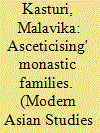

|
|
|
|
|
| Publication |
2009.
|
| Summary/Abstract |
This paper examines a fundamental premise of Anglo-Hindu law on succession between 1860 and 1940, that kinship was emblematic of secular modes of living, to analyse its implications for the assertion of masculinity within ascetic orders in northern India. Legal discourses engaged with rights to succession within ascetic orders, by functioning on the assumption that the renunciatory life of ascetics was antithetical to sexuality and domesticity. This institutionalization of law, that defined asceticism and fixed ascetic masculinities within a legal frame, occurred with the consent of ascetic orders concerned with the ownership and distribution of property, even though sexuality and gender played a central role in shaping relationships within sacred spaces. Myriad ties embracing the language of kinship shaped ascetic orders. Bonds of sentiment and sexual attachment over-lapped with, sustained, and produced the bonds tying spiritual preceptors to their disciples. Relationships within ascetic families, consisting of men, their female companions, children and relatives, along with their attendant obligations were validated through rights of ownership and inheritance to property. Taking advantage of Anglo-Hindu law by the early twentieth century, ascetic orders sought to 'purify' their genealogies through the medium of property disputes fought in colonial courts. By manipulating the legal meanings ascribed to asceticism, masculinity and renunciation, these orders effaced unwanted members from their orders with varying degrees of success, especially women and children.
|
|
|
|
|
|
|
|
|
|
|
|
|
|
|
|
| 2 |
ID:
044904
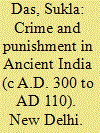

|
|
|
|
|
| Publication |
New Delhi, Abhinar Publication, 1977.
|
| Description |
xi,173p.
|
|
|
|
|
|
|
|
|
|
|
|
Copies: C:1/I:0,R:0,Q:0
Circulation
| Accession# | Call# | Current Location | Status | Policy | Location |
| 027479 | 364.095401/DAS 027479 | Main | On Shelf | General | |
|
|
|
|
| 3 |
ID:
120343
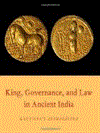

|
|
|
|
|
| Publication |
Oxford, Oxford University Press, 2013.
|
| Description |
xxvii, 753p.Hbk
|
| Standard Number |
9780199891825
|
|
|
|
|
|
|
|
|
|
|
|
Copies: C:1/I:0,R:1,Q:0
Circulation
| Accession# | Call# | Current Location | Status | Policy | Location |
| 057331 | 351.01/OLI 057331 | Main | On Shelf | Reference books | |
|
|
|
|
| 4 |
ID:
102037


|
|
|
|
|
| Publication |
2011.
|
| Summary/Abstract |
Studies of the post-colonial state have often presented it as a structure that has fallen under the control of self-interested sections of the Indian elite. In terms of citizenship, the failure of the state to do more to realize the egalitarian promise of the Fundamental Rights, set out in the Constitution of 1950, has often been attributed to interference by these powerful elite. Tracing the interplay between debates about Hindu property rights and popular support or tolerance for the notion of individual, liberal citizenship, this paper argues that the principles espoused in the Fundamental Rights were never neutral abstractions but, long before independence, were firmly embedded in the material world of late-colonial political relations. Thus, in certain key regards, the citizen-subject of the Indian Constitution was not the individual, freed from ascriptive categories of gender or religious identity, but firmly tied to the power structures of the community governed by Hindu law.
|
|
|
|
|
|
|
|
|
|
|
|
|
|
|
|
| 5 |
ID:
087508
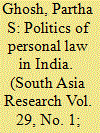

|
|
|
|
|
| Publication |
2009.
|
| Summary/Abstract |
Focusing explicitly on a political science perspective, this article argues that the inter-communal politics of personal law debates in India can be seen as a politically navigated form of identity construction. Specifically the Hindu-Muslim debates demonstrate that today, such contested matters of identity are not merely debated within national boundaries but have also taken on global dimensions which need to be accounted for. Inter-communal politics evidently have important implications for electoral politics, but manipulations of personal laws run the risk of making bad politics.
|
|
|
|
|
|
|
|
|
|
|
|
|
|
|
|
| 6 |
ID:
024165
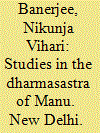

|
|
|
|
|
| Publication |
New Delhi, Munshiram Manoharlal Publishers, 1979.
|
| Description |
vi, 117p.
|
|
|
|
|
|
|
|
|
|
|
|
Copies: C:1/I:0,R:0,Q:0
Circulation
| Accession# | Call# | Current Location | Status | Policy | Location |
| 028981 | 303.0954/BAN 028981 | Main | On Shelf | General | |
|
|
|
|
|
|
|
|
|